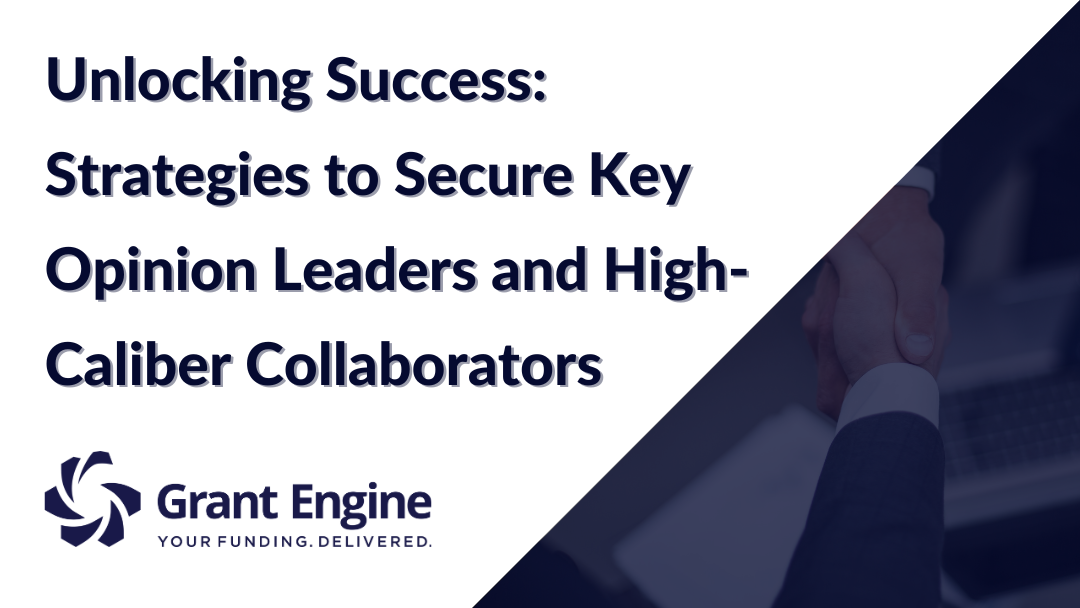In our dynamic world of life sciences, the journey from innovative idea to market success is complex and challenging. Starting in the early 1940’s the KOL has become an instrumental and pivotal aspect to a viable go to market strategy. One crucial aspect of this journey is establishing connections with Key Opinion Leaders (KOLs) and high-caliber collaborators. These influential figures can be pivotal in elevating your project’s credibility, guiding research direction, and enhancing the overall impact of your work. In this blog, we’ll explore effective strategies to attract and secure the support of these esteemed professionals.
Understanding the importance of KOLs and collaborators is crucial. KOLs are not just experts in their fields; they are respected voices whose opinions shape trends and influence peers. They can lend significant weight to your project, from validating your scientific approach to endorsing your product. Collaborating with high-caliber professionals, meanwhile, brings in diverse expertise and resources, essential for navigating the complexities of life sciences ventures. Emerging during Covid, another dimension of expert has emerged the digital opinion leader (DOL). This article combines the two and uses the KOL naming convention.
In looking into the journey of securing leading collaborators, we researched what top KOLs and collaborators seek when they are approached by a partner. We scoured the literature, interviewed our key members of our team, and asked clients what their experience has been. What we found was that establishing new relationships with KOLs and leading collaborators and deepening these relationships in the day-to-day conduct of collaborative research is an intricate blend of scientific, social, political, and even ethical concerns. This complexity was unexpected by us and made the journey more interesting and multi-dimensional than previously considered.
Through our work, we generated a list key of key criteria for what leading KOLs and collaborators are looking for. This list originated from good and bad research collaborations (Parker, et. al) and was updated by Grant Engine from our primary research.
- Active involvement in cutting-edge, interesting science
- Effective Leadership
- Competence in and commitment to good scientific practice
- Combination of open-mindedness and critical-thinking
- Respect for the needs, interests and agendas of all partners
- Opportunities for discussion and disagreement
- Trust and confidence
- Justice and fairness in collaboration
Strategies to Attract KOLs and Elite Collaborators:
Identify the Right Individuals: Research to identify KOLs and potential collaborators who align with your project’s goals. Focus on those with a history of interest or expertise in your specific area. Utilize professional networking platforms, attend industry conferences, and engage with academic institutions. Use PubMed and NIH Reporter.
Build a Compelling Narrative: KOLs are drawn to innovative, impactful projects. Craft a narrative that highlights the uniqueness of your product or research and its potential to make a significant difference in human health. Make your vision and passion evident. HBR has a useful guide here.
Leverage Your Networks: Utilize your existing professional network to establish initial contact. A mutual connection can provide a more personalized introduction than cold outreach.
Showcase Your Expertise and Credibility: Demonstrate your team’s expertise and the robustness of your work. Publications, patents, or previous successful projects can significantly enhance your credibility.
Engage in Thoughtful Outreach: When reaching out, be respectful of their time. Personalize communication and clearly articulate what you are seeking from the collaboration and what you offer in return.
Offer Mutual Benefits: Emphasize the mutual benefits of the collaboration. This could include co-authorship opportunities, access to unique research data, or potential to co-develop groundbreaking solutions.
Lead with Professionalism and Transparency: Be transparent about your project’s stage, potential risks, and expectations. Professionalism in all interactions is key to building trust.
Follow-Up and Foster Relationships: After initial contact, keep potential KOLs and collaborators engaged with updates on your progress. Building a relationship takes time and consistent effort.
Securing the support of KOLs and high-caliber collaborators is not just about adding renowned names to your project. It’s about enriching your venture with expertise, insight, and networks that can significantly enhance your path to success. By following these strategies, you can build valuable connections that support your journey in the life sciences sector.
Remember, at Grant Engine, we specialize in navigating these pathways and can provide tailored assistance in writing letters of support with KOLs and collaborators. Contact us today to learn how we can support your life sciences venture: (650) 937-9164, or contact us here.


Recent Comments